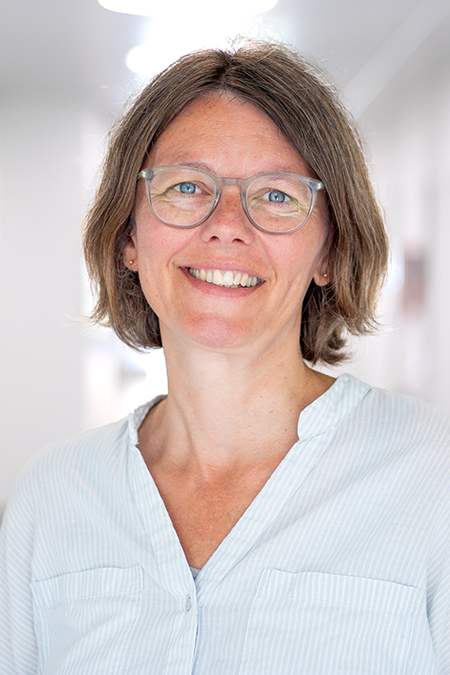"I do my best to establish a safe learning space"
So says Associate Professor Dorte Rytter, who, among other things, teaches Bachelor’s and Master’s students in basic and advanced epidemiology and biostatistics, and Master’s students in health science research.
Teaching difficult subjects is an exciting professional challenge
Dorte Rytter loves teaching, and she is passionate about her students.
She teaches epidemiology and biostatistics, at both basic and advanced levels. She also instructs students in the health science project assignment and in how to conduct health science research.
These courses are all necessary to continue in the respective programmes, so the courses count for many ECTS credits.
"Making mistakes or saying something wrong provides a lot of learning. That's why I work hard to establish a safe learning space in which we embrace and support each other"
For Dorte Rytter, teaching the very diverse students at the department in subjects which are both important and demanding, and which many students find difficult, is an exciting professional challenge. Many students dread the courses, and Dorte Rytter has to fail several students every semester.
"Making mistakes or saying something wrong provides a lot of learning. That's why I work hard to establish a safe learning space in which we embrace and support each other. If the students aren't confident, they can't learn anything," she says, explaining that one of the challenges is that the students don't want to lose face, either with her or with their fellow students.
Literary criticism is at the top of the curriculum
Dorte Rytter designs specific teaching programmes with a good mix of lectures, exercises, workshops and group work.
But first and foremost, she and her teaching colleagues encourage students to be critical and reflective readers of health science literature.
In the epidemiology and biostatistics course, students learn about concepts such as study designs, confounding, selection and information bias.
"These are important competencies if our students are going to pursue a career in research or want to work in regions and municipalities and implement new health science solutions for patients or citizens. Students must be able to assess quality and sort through the literature," Dorte Rytter stresses.
I always take student evaluations seriously
Dorte Rytter is not alone in her teaching. She draws inspiration and input from her colleagues. She has also made use of the competency development, supervision and sparring offered by Aarhus University's Centre for Educational Development (CED).
"I would like to have more time to develop my courses further. But I try to adapt and adjust every year, and I always take student evaluations seriously," she says, and elaborates:
"It can be difficult to meet all students’ expectations, and, in particular, the epidemiology and biostatistics courses often divide opinion. But if the evaluations contain good advice on how I can better organise teaching within the given framework and improve learning opportunities and motivation for students, then I have a lot to gain from listening."
"I would like to have more time to develop my courses further. But I try to adapt and adjust every year, and I always take student evaluations seriously,"
In a relatively new initiative, she has delegated some teaching duties to her younger colleagues. This means that student teachers are responsible for classroom instruction in the second semester of the epidemiology and biostatistics course. And according to Dorte Rytter, it works extremely well.
"They’ve very recently had to understand and master the curriculum themselves, and I think that this gives them a huge advantage in terms of teaching and explaining the material differently than I can. They’re really good at classroom instruction," says Dorte Rytter.
She and a colleague from biostatistics still organise the lectures themselves.
Students at the department are very diverse
According to Dorte Rytter, the student population at the Department of Public Health is rather diverse, and that places demands on teaching.
"I like having such diverse students. I've taught plenty of medical students for whom the epidemiology and biostatistics course can be a necessary evil. And then I have students on the Master's programme in health science who, after years on the labour market, are really motivated and eager to learn. It’s important to motivate them differently, and as a teacher I like that," she says.
She goes on to describe how very satisfying it is to witness the students' development.
"It's a pleasure to follow the talented students, but it's just as rewarding and motivating to see students make it through after having had a hard time. When I feel that I’ve advanced them professionally and helped them move on, I’m happy and proud," says Dorte Rytter.

5 highlights about Dorte Rytter
- Associate professor in epidemiology and teaches four different courses.
- Responsible for the department's vaccination-epidemiological research and leads Denmark's largest study of possible side effects of Covid vaccines, which approximately 900,000 Danes have been invited to participate in.
- Supervisor for a number of thesis and PhD students.
- One of the key researchers in the FEMaLe project, a major international research and innovation project aiming to improve treatment and quality of life for patients with endometriosis. The EU is supporting the project with DKK 45 million from the Horizon 2020 pool.
- Originally trained as a biologist in zoophysiology at Aarhus University.